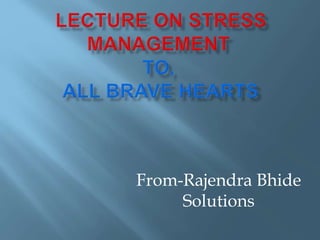
Lecture on stress management
- 2. Stress is the body’s automatic response to any physical or mental demand placed on it. Situations, Activities, Relationships Cause ‘Disturbance’ To Physical, Mental, Emotional, Psychological Self
- 3. Unleash Heat Steam Either
- 5. Need Meaning (having things) survival Food, Shelter, Work Protection Social Security, Health Systems, Work Affection Friendships, Family, Relationships With Nature Understanding Literature, Teachers, Policies, Educational Participation Responsibilities, Duties, Work, Rights Leisure Games, Parties, Peace Of Mind Creation Abilities, Skills, Work, Techniques Identity Language, Religions, Work, Customs, Values, Norms Freedom Equal Rights
- 6. Mostly, literal requirements for human survival If not met, the human body cannot function Metabolic needs – air, water, food, rest Clothing, shelter – needed by even animals Could be classified as basic animal needs
- 7. Once physical needs are met, safety needs take over Personal including emotional Health and well-being Financial, job security Safety of property against natural disasters, calamities, wars, etc Law & order
- 8. Need to love and be loved Need to feel a sense of belonging and acceptance Small groups – clubs, office teams, school/college houses Large groups – political parties, Sports teams, facebook
- 9. Need to be respected by others and in turn respect them Sense of contribution, to feel self-valued, in profession or hobby Lower - respect of others, the need for status, recognition, fame, prestige, and attention Higher - self-respect, the need for strength, competence, mastery, self-confidence, independence and freedom
- 10. What a man can be, he must be Intrinsic growth of what is already in a person Growth-motivated rather than deficiency- motivated Cannot normally be reached until other lower order needs are met Rarely happens - < 1% Acceptance of facts, spontaneous, focused on problems outside self, without prejudice
- 13. • Question: Do you think too much about past? • Question: Do you think too much about future? • Question: Do you have financial problems? • Question: Do you think too much to make others happy? • Question: Do you have good relations with your spouse and kids? • Question: Do you have a healthy professional circumstances? • •
- 14. • Question: Do you read good books? • Question: Do you walk for 15 minutes daily or go to the park?- • Question: Do you laugh often? By watching funny programs or sharing jokes? • Question: Do you have a best friend with whom you can share your feelings and discuss your problems? • Question: when was the last time you gave something in charity? • Question: when was the last time you rewarded yourself by buying something good for you?
- 15. 1. Physical - Weight gain/loss - Unexpected hair loss - Heart palpitations - High blood pressure 2. Emotional - Mood swings - Anxiety - Can lead to depression • Can also lead to unhealthy coping strategies (i.e. alcohol, drugs, etc)
- 16. Stress Relief Strategies 1. Body relaxation exercises - breathing techniques - guided imagery 2. Physical exercise -yoga -work out routine 3. Meditation 4. Counseling -talk therapy -life coaching
- 17. Changing perceptions and expectations Break jobs/tasks into manageable parts Set reasonable/realistic goals Set boundaries Don’t compromise your values/beliefs Schedule “me” time
- 18. Physical health gets better -more energy and stamina Emotions stabilized -positive attitude -hopeful/happier Ability to focus improved -able to learn and achieve
- 19. Something that is necessary for an organism to live a healthy life Deficiency would cause a clear negative outcome - deficiency or death Can be Objective/Physical or Subjective Objective needs - food, shelter, sleep Subjective needs – affection, acceptance, self- esteem
- 20. Is A Process, In Which Two Elements Exist At “One Given Time” Together And They Oppose Each Other Or Are Mismatched.
- 21. Statements on Conflict" I tend to avoid conflict I depend on harmony I always stand up and express my opinion I hate conflict I like conflict because it produces results and progress I often compromise in conflict I have lost in conflict
- 22. Hidden Conflicts: below the surface, often not visible; these differences are felt but parties have not decided yet how to act or react. Rising Conflicts: acute conflict issues that may have just erupted, but have not become systemic, or involved anyone beyond the immediate parties. Clear Cut Conflicts: disputes that are in the active stage. People have made a decision on how they are going to address the threat to their interest and have selected a method of action .
- 23. Interest conflicts: These refer to the actions and emotions by which people become involved to gain or protect their needs. Information conflicts: Caused by lack of information or differences in same information Relationship conflicts: Are due to differences of personality and emotions, as well as misperceptions, stereotypes and prejudices. Structural conflicts: Emerge over differing ideas concerning process, rules and power to control time and space such as in land boundaries, distribution of goods, or resource use issues. Value conflicts: Refers to clashes between cultural, social or personal beliefs or different world views and traditions.
- 24. Conflicts over access: This includes conflicts that result as a consequence of a change in access or inequitable access. Conflicts due to change in resource quality and availability: The cause of these conflicts can be either a change in the 'amount' or the quality of the resource available to the different parties. Conflicts regarding authority over resource: Such conflicts stem from a shift in decision-making authority over a resource.
- 25. Conflicts that result from differences in use and non-use economic values: associated with the resource as well as differences in cultural, ethical or religious values. Conflicts associated with information processing and availability Conflicts resulting from legal/policy interests: These conflicts can result from different interests in different institutions.
- 26. Driver -Passenger Passenger- Driver Driver –Driver Passenger -Passenger
